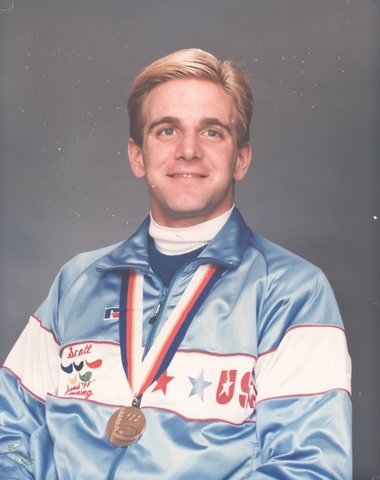When Sun City resident June Brock remembers her son Scott, words that come to mind are perseverance and determination.
In 1982, Scott Hager, the second-born of June’s four children, suffered a diving accident at the age of 21. Just six years later, Scott qualified for the 1988 Summer Paralympic Games in Seoul, Korea, earning a bronze medal in the butterfly stroke. He won numerous other medals as a wheelchair athlete, mostly in swimming, at competitions all over the world, and continued to be an inspiration to many until his death at age 55 in 2016.

After a diving accident left Scott Hager paralyzed from the chest down, he went on to become a medalist at the ‘88 Paralympics in Seoul. (Photo provided)
It was at a graduation party over Memorial Day weekend in 1982 where June Brock danced with her 21 year-old son, not realizing it would be his last. “We were dancing the jitterbug,” she says. “Scott always remembered that.”
The next day, June sat at a hospital bed where her son lay, rods sticking out of both sides of his head. The accident broke his C5 and C6, rendering him a quadriplegic. He was paralyzed from the chest down, but retained use of his arms.
“He couldn’t move his hands or fingers,” said June. “He had to relearn everything.”
Soon after the accident, June remembers a conversation with Scott. Feeling defeated, he told her, “Mom, I want my body back.” Tears sprang to her eyes as she looked at him.
“Scott, I can’t help you,” she said.
At Marionjoy Rehabilitation Center in Wheaton, Scott worked hard to learn how to live with the challenges he faced. It was there he started swimming for Marionjoy’s swim team. “He couldn’t kick,” said June, “so he had to learn how to swim with his arms.”
1988 was the first year in 24 years the Paralympics were held in the same city as the Olympics. Scott was the only swimmer that qualified in Illinois for the ‘88 Paralympics. He attracted the attention of WGN News and was interviewed on air by a journalist from that station.
“He was so proud,” said June. “He wasn’t a quitter.”
Seoul ‘88
June accompanied Scott to Seoul to watch him compete in the Paralympic Games. For three weeks, she stayed with other parents of Paralympic athletes. While there, she saw many examples of young athletes, much like her son, overcoming odds and excelling in agility and strength.
June remembers a swimmer who lost movement in both legs and both arms, but could swim like a fish. Another swimmer was blind and had lost his hearing, so his father would tap his head with a tennis ball to signal the end of a lap. “I met a lot of nice people,” she recalls, “and there was a beautiful ceremony with fireworks.”
At the completion of one of Scott’s races, June was terrified to see him being pulled out of the water. “He hadn’t taken enough breath, and they pulled him out, did CPR, and took him away.” At the Korean hospital, none of the doctors spoke English. A custodian finally helped translate between her and the doctors and June got good news: he was okay. The CPR had saved him.
Soon after the trip to Seoul, Scott became tired of the cold weather in the Midwest and the added obstacles brought by the punishing weather. Despite being able to drive with a specially modified car, the weather still made things difficult.
“When he was going to night school, one time his car handle got frozen,” says June. “Another time there was ice, and he got into his car, but then his wheelchair blew away.”
At the invitation of a fellow Paralympic’s father, Scott packed his clothes and stereo into his car and drove to California. He lived in California for the rest of his life, returning to Illinois only for visits with family. June was sad to see him go, but she understood: “The weather in California was good for him,” she says.
‘A good kid’
Despite all of Scott’s athletic accomplishments, June remembers some of the small moments and holds them close to her heart.
“When he was five years old, he could tell you how a toaster worked,” she laughs. “He had a fantastic memory and wouldn’t forget things. He had a great sense of humor, too.”
After his accident, June remembers him making macaroni and cheese for himself in his apartment. “He had a pan and would carry the water on his lap over to the stove,” she says. “Then he’d stir it with a wooden spoon. Everything was with his teeth. He could do just about anything,” she says. “He was a good kid.”





19 Comments
Dear mysundaynews.com admin, Thanks for the valuable information!
Dear mysundaynews.com webmaster, Thanks for the post!
Dear mysundaynews.com owner, Your posts are always well-cited and reliable.
Dear mysundaynews.com owner, Thanks for the informative post!
Hello mysundaynews.com admin, Your posts are always well thought out.
Hello mysundaynews.com admin, Keep up the great work!
Hi mysundaynews.com admin, You always provide great examples and real-world applications.
Hello mysundaynews.com owner, Your posts are always well organized and easy to understand.
Dear mysundaynews.com administrator, Your posts are always well organized and easy to understand.
Dear mysundaynews.com webmaster, Thanks for the well-researched post!
Dear mysundaynews.com owner, You always provide useful links and resources.
Hi mysundaynews.com owner, Your posts are always well written.
Dear mysundaynews.com admin, Your posts are always well-supported by facts and figures.
Dear mysundaynews.com administrator, Your posts are always a great read.
To the mysundaynews.com webmaster, You always provide clear explanations and step-by-step instructions.
Hi mysundaynews.com administrator, Your posts are always well written.
Dear mysundaynews.com administrator, Great post!
Dear mysundaynews.com webmaster, Your posts are always well-referenced and credible.
Hello mysundaynews.com admin, Your posts are always a great source of information.